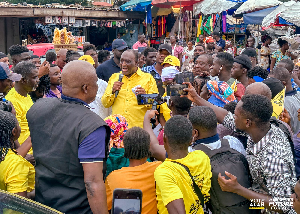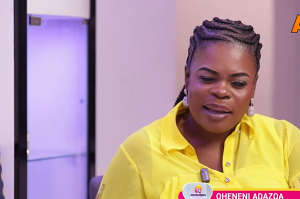Alan Kyerematen, the leader and presidential candidate of the Movement for Change/Alliance for Revolutionary Change, continued his "meet and greet" campaign, attracting enormous crowds in every community he visited.
The diversity of his supporters from market women and drivers to corporate executives underscores the broad appeal of his message.
His vision for a government of national unity and the Great Transformational Plan (GTP) is captivating an electorate that is eager for change.
The overwhelming response to Alan Kyerematen’s campaign has sent shockwaves through his opponents, signalling a potential shift in Ghana’s political landscape.
His ability to galvanize a third force capable of challenging the dominance of the NDC and NPP is turning a long-held dream into a burgeoning reality.
The increasing support from women, who express deep disappointment with the current political establishment, is particularly striking.
For many, Kyerematen represents not just an alternative, but a superior choice for the nation’s future, advocating for national unity and development over partisan division.
A man who identified himself as an executive banker from Stanbic said, “I’ve been watching him on Pan African TV on Thursdays, and I’m convinced he’s the best man for the job. My impression has completely changed. I will vote for him.”
The sentiment for change was also voiced by Alex Tettey Nyarko, a transport union leader at one of the lorry stations.
He enthusiastically remarked, "What excites me about Alan Cash is his decision to break away from the NPP and his policy to remove duties on the importation of spare parts in two years. We can assure him of our votes.
"We are sick and tired of the NDC and NPP."
This growing consensus among voters from various backgrounds suggests that Kyerematen’s candidacy is not only viable but increasingly popular.
Following his meet-and-greet tour, he called for private capital investments instead of government borrowing, pledging that under his leadership, major infrastructure projects would be funded by the private sector.
He stressed that a government of national unity is essential to heal the deep political divisions created by the NDC and NPP.
He also underscored the importance of his Great Transformational Plan, questioning the continued dependence on manifestos that have failed to transform the economy over the past 32 years.
If the current trend continues, Alan Kyerematen’s support base could lead to an unprecedented outcome on December 7th.
The possibility of Ghana electing its first independent president is no longer a distant dream but a tangible reality that could reshape the nation’s future.
Alan Kyerematen’s momentum is building, and the political establishment may soon face a historic challenge.

Politics of Saturday, 24 August 2024
Source: James Kumi-Korsah, Contributor













